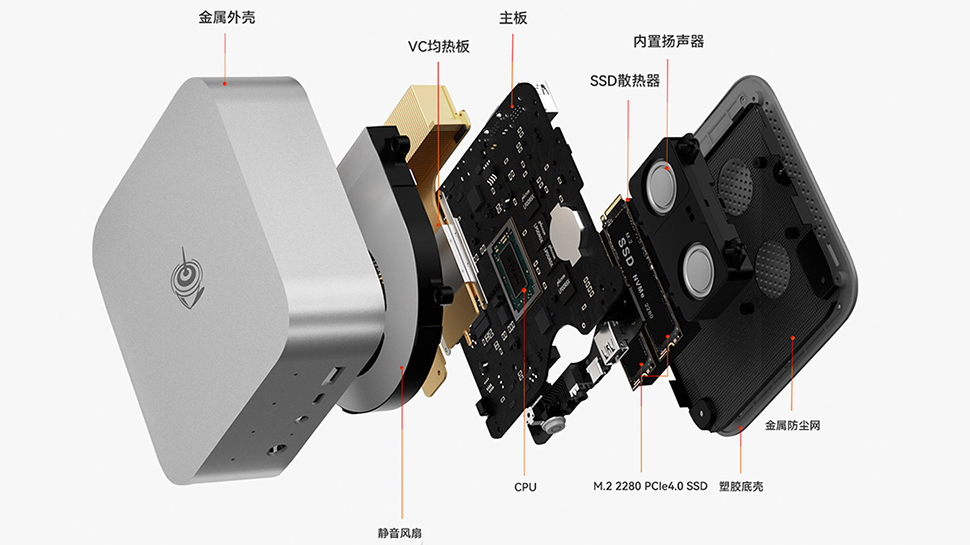Chinese manufacturer Beelink has earned a reputation for producing quality mini PCs across a range of price points. The Beelink U59 is a definite standout for those looking for a budget option – in our four and a half star review we said it offered a “good feature set that might appeal to many different customers.”
Beelink also offers higher-end products like the GTi Ultra, which features Intel‘s 12th to 14th Gen Core CPUs, with support for Beelink’s exclusive eGPU solution for users requiring extra graphics power. Beelink has been developing its SER series for some time. Its most recent release was the SER8 model powered by an AMD Ryzen 7 8845HS Hawk Point processor, 32GB of DDR5 memory, and 1TB of storage. Priced around $650, the SER8 delivered strong performance in a compact design.
Coming up next is the SER9, the first mini PC to feature AMD‘s Ryzen AI 9 HX 370 Strix Point CPU, paired with AMD Radeon 890M graphics. The Strix Point processor includes four Zen 5 cores, eight Zen 5c cores, and AMD’s latest RDNA 3.5 Radeon 890M integrated graphics. It also incorporates a Ryzen NPU capable of up to 50 TOPS of AI performance, making it ideal for AI-driven tasks. If you need extra AI functionality, the SER9 includes a built-in MIC AI chip for seamless voice recognition.
Design-wise, the SER9 closely mirrors its predecessor, the SER8, as well as the GTi Ultra. Although we haven’t had any confirmation, is expected to come with 32GB of LPDDR5x-7500MHz memory and an M.2 slot for PCIe 4.0 SSD storage. According to information leaked on Weibo, the mini PC will be available in four colors: Frost Silver, Flame Orange, Pine Green, and Deep Gray. As with many mini PCs, the Beelink SER9 offers a wide range of ports. It includes a USB4 Type-C port (40 Gbps), a USB 3.2 Gen 2 Type-C port (10 Gbps), two USB 3.2 Gen 2 Type-A ports (10 Gbps), two USB 2.0 Type-A ports (480 Mbps), an HDMI 2.0 port, and a DisplayPort 1.4. There’s also a 2.5 GbE Ethernet port, with two 3.5mm audio jacks for microphones and speakers. This model also includes integrated speakers.
Beelink has stated that the SER9 will be priced at $999, with shipping expected to begin in October. While initially announced for the Chinese market, the mini PC is anticipated to be available globally (eventually) through Beelink.com.
Ports galore
More from TechRadar Pro
Technology
Neil Lawrence interview: The AI expert who says artificial general intelligence is nonsense


What sets humans apart from the rest of life, or indeed inert matter? Many people would respond that it is our intelligence. Yet the rise of seemingly intelligent machines challenges this way of thinking. The companies behind these new artificial intelligence technologies, in the form of ChatGPT and its rivals, speak of achieving artificial general intelligence – machines that have the same level of intelligence as humans across a range of tasks.
Does this meteoric rise in AI make human intelligence, and therefore us, less special? Neil Lawrence, professor of machine learning at the University of Cambridge, doesn’t think so. In fact, he thinks we should throw out the concept of artificial general intelligence altogether.
In his new book The Atomic Human: Understanding ourselves in the age of AI, Lawrence makes the case that it is only by better understanding our own intelligence, and how wildly different it is to its artificial counterpart, that we can make the most of both. Here he tells New Scientist why he thinks both human and artificial intelligence are misunderstood, why it is pointless to compare the two and why, ultimately, we need a more nuanced understanding of intelligence.
Alex Wilkins: What do you make of the trend to compare artificial to human intelligence?
Neil Lawrence: Most of these arguments are pointless, they are irrelevant. Of course, the nature of the intelligence that we’re seeing in AI is extremely different from our own. It’s absurd that people are talking about this intelligence as if it’s anything to do with us.…
Technology
28 Years Later was partially shot on an iPhone 15 Pro Max

Danny Boyle’s zombie sequel 28 Years Later was shot using several iPhone 15 Pro Max smartphones, . This makes it the biggest movie ever made using iPhones, as the budget was around $75 million.
There are some major caveats worth going over. First of all, the sourcing on the story is anonymous, as the film’s staff was required to sign an NDA. Also, the entire film wasn’t shot using last year’s high-end Apple smartphone. Engadget has confirmed that Boyle and his team used a bunch of different cameras, with the iPhone 15 Pro Max being just one tool.
Finally, it’s not like the director just plopped the smartphone on a tripod and called it a day. Each iPhone looks to have been adapted to integrate with full-frame DSLR lenses. Speaking of, those professional-grade lenses cost a small fortune. The phones were also nestled in protective cages.
Even if the phones weren’t exclusively used to make this movie, it’s still something of a full-circle moment for Boyle and his team. The original 28 Days Later was shot primarily on a that cost $4,000 at the time. This camcorder recorded footage to MiniDV tapes.
28 Years Later is the third entry in the franchise and is due to hit theaters in June 2025. The film stars Jodie Comer, Aaron Taylor-Johnson, Ralph Fiennes and Cillian Murphy. This will be the first of three new films . Plot details are non-existent, but all three upcoming movies are being written by Alex Garland. He co-wrote the first one and has since gone on to direct genre fare like Ex Machina, and, most recently, Civil War. He also made a truly underrated .
As for the intersection of smartphones and Hollywood, several films have been shot with iPhones. These include Sean Baker’s Tangerine and Steven Soderbergh’s Unsane.
Technology
Netflix reveals new games based on Rebel Moon and other shows


As part of its Geeked Week announcements, Netflix revealed more details about new games coming to its platform. Several of the games are based on the company’s shows, including Rebel Moon and Squid Game, while others such as Monument Valley 3 are well-regarded IPs in their own right. Several of the games are coming in 2025, while others are s…Read More
Technology
M&As and AI are in the spotlight, but there’s still capital left for quick commerce and more

Welcome to Startups Weekly — your weekly recap of everything you can’t miss from the world of startups. Want it in your inbox every Friday? Sign up here.
This week brought reassuring signs that dealmaking is still happening on both sides of the table. New unicorns are being minted, and more capital is flowing into AI, but deals are also coming from some unexpected directions.
Most interesting startup stories from the week

AI news was plentiful this week, but also varied, from large and small M&As to new launches.
AI portfolio: Typeface, a generative AI unicorn, purchased two companies to expand its enterprise offering: New York City-based Treat, which uses AI to create personalized photo products, and Narrato, an Australian AI-powered content creation and management platform.
AI again: Global HR company Workday bought AI-powered contract management platform Evisort, adding to its AI-related acquisitions. The companies didn’t disclose the price tag, but Evisort had raised $155.6 million in capital and debt.
FinOps FTW: IBM acquired Kubecost, a Kubernetes cost optimization startup, as its name suggests. This is another sign of the ongoing rise of FinOps, which may also be boosted by the need to lessen the cost and impact of GenAI.
Only you: Recently launched SocialAI is a social network with a big twist — it is filled with bots, and that’s on purpose. Founder Michael Sayman told TechCrunch that his goal was for users to be able to bounce ideas off a diverse community of AIs.
Most interesting fundraises this week

This week was also busy on the dealmaking front, and some of the capital went to sectors and places you might not necessarily expect.
Flying solo: Quick commerce app Flink raised $150 million, including $115 million in equity. The near-unicorn was once an acquisition target of competitors but is now seeking to forge its own path, with a focus on Germany and the Netherlands.
On alert: New York-based startup Intezer raised $33 million to make sure security teams aren’t overwhelmed by alerts. Using AI, the startup helps them with not only triaging, but also with investigation, which it does much faster than a human would, CEO Itai Tevet said.
Getting permits: NYC-based GreenLite raised a $28.5 million Series A round to facilitate construction permitting. Its co-founders don’t come from the construction sector but previously worked at Gopuff, which got its own taste of dealing with permits when it tried to launch a ghost kitchen network across the U.S.
Tailwinds: Armenian B2B SaaS startup EasyDMARC raised a $20 million Series A round of funding to simplify email security and authentication. The company facilitates the adoption of a technical standard that Google and Yahoo will soon make mandatory for bulk email senders.
Most interesting VC and fund news this week

Accelerating: Salesforce Ventures announced at Dreamforce that its San Francisco-based AI fund would once again double in size and reach $1 billion, a significant acceleration compared to the $5 billion total deployed in its first 15 years.
Decacorn fund: Insights Partners is nearing a whopping $10 billion fundraise for its 13th fund, according to the Financial Times, which also noted the recent sales of two Insight portfolio companies, Own and Recorded Future.
Builders: Proptech venture firm Era Ventures raised $88 million for its first fund, which will be deployed in startups from seed to Series B. Its portfolio includes Honey Homes, a subscription service for handymen that has raised $21.35 million in venture funding to date.
Last but not least

In a recent episode of the Equity podcast, J.P. Morgan’s Head of Startup Banking Ashraf Hebela discussed his recent Startup Insights report and what it might take to create a unicorn in 2024. He also touched on the hot topic of “Founder Mode.”
Technology
8BitDo now sells the NES-themed keycaps from its retro keyboard

8BitDo is now selling a set of keycaps featuring the same Nintendo Entertainment System (NES) inspired design as those used on the Retro Mechanical Keyboard it debuted last July. While the keyboard is now available in four styles including Commodore 64 and Famicom designs, only the NES style keycaps are currently available on their own.
The $49.99 8BitDo Retro Keycaps set includes 165 PBT keys with legends printed using dye-sublimation for added durability. The expanded set allows the keys to be used on larger keyboards with a dedicated number pad. 8BitDo’s $99.99 mechanical keyboards are only available in a shorter tenkeyless layout.
The set features alternate designs for some keys like a spacebar with an added health meter in two different lengths, and both the American ANSI and international ISO versions of others, like an Enter key with an inverted L design, and a smaller Shift key. 8BitDo says the set supports 65, 75, 80, 95, and 100-percent layouts, as well as ergonomic split keyboards, but compatibility is limited to MX-style switches.
Science & Environment
This power company has outpaced Nvidia, could ink next nuclear deal after Three Mile Island
Technology
This is the world’s most powerful Mini PC and I can’t wait to test it: Beelink’s tiny computer packs the Ryzen AI 9 HX 370 CPU and promises to deliver the GPU performance of an RTX 3050 with a whopping 50 TOPS


-

 Sport1 day ago
Sport1 day agoJoshua vs Dubois: Chris Eubank Jr says ‘AJ’ could beat Tyson Fury and any other heavyweight in the world
-

 News2 days ago
News2 days agoYou’re a Hypocrite, And So Am I
-

 Science & Environment1 day ago
Science & Environment1 day ago‘Running of the bulls’ festival crowds move like charged particles
-

 News1 day ago
News1 day agoIsrael strikes Lebanese targets as Hizbollah chief warns of ‘red lines’ crossed
-

 CryptoCurrency1 day ago
CryptoCurrency1 day agoEthereum is a 'contrarian bet' into 2025, says Bitwise exec
-

 Science & Environment2 days ago
Science & Environment2 days agoSunlight-trapping device can generate temperatures over 1000°C
-

 CryptoCurrency1 day ago
CryptoCurrency1 day agoBitcoin miners steamrolled after electricity thefts, exchange ‘closure’ scam: Asia Express
-

 CryptoCurrency1 day ago
CryptoCurrency1 day agoCardano founder to meet Argentina president Javier Milei
-

 CryptoCurrency1 day ago
CryptoCurrency1 day agoDorsey’s ‘marketplace of algorithms’ could fix social media… so why hasn’t it?
-

 CryptoCurrency1 day ago
CryptoCurrency1 day agoLow users, sex predators kill Korean metaverses, 3AC sues Terra: Asia Express
-

 Science & Environment1 day ago
Science & Environment1 day agoQuantum ‘supersolid’ matter stirred using magnets
-

 Sport1 day ago
Sport1 day agoUFC Edmonton fight card revealed, including Brandon Moreno vs. Amir Albazi headliner
-

 Technology1 day ago
Technology1 day agoiPhone 15 Pro Max Camera Review: Depth and Reach
-

 Science & Environment1 day ago
Science & Environment1 day agoHow one theory ties together everything we know about the universe
-

 CryptoCurrency1 day ago
CryptoCurrency1 day agoCertiK Ventures discloses $45M investment plan to boost Web3
-

 CryptoCurrency1 day ago
CryptoCurrency1 day agoDZ Bank partners with Boerse Stuttgart for crypto trading
-

 CryptoCurrency1 day ago
CryptoCurrency1 day agoRedStone integrates first oracle price feeds on TON blockchain
-

 CryptoCurrency1 day ago
CryptoCurrency1 day agoBitcoin bulls target $64K BTC price hurdle as US stocks eye new record
-

 CryptoCurrency1 day ago
CryptoCurrency1 day agoSEC asks court for four months to produce documents for Coinbase
-

 CryptoCurrency1 day ago
CryptoCurrency1 day ago‘No matter how bad it gets, there’s a lot going on with NFTs’: 24 Hours of Art, NFT Creator
-

 CryptoCurrency1 day ago
CryptoCurrency1 day agoBlockdaemon mulls 2026 IPO: Report
-

 CryptoCurrency23 hours ago
CryptoCurrency23 hours agoCoinbase’s cbBTC surges to third-largest wrapped BTC token in just one week
-

 Politics1 day ago
Politics1 day agoLabour MP urges UK government to nationalise Grangemouth refinery
-

 News23 hours ago
News23 hours agoBrian Tyree Henry on voicing young Megatron, his love for villain roles
-

 Science & Environment2 days ago
Science & Environment2 days agoHow to wrap your mind around the real multiverse
-

 Science & Environment2 days ago
Science & Environment2 days agoQuantum time travel: The experiment to ‘send a particle into the past’
-

 Science & Environment1 day ago
Science & Environment1 day agoNuclear fusion experiment overcomes two key operating hurdles
-

 CryptoCurrency1 day ago
CryptoCurrency1 day ago2 auditors miss $27M Penpie flaw, Pythia’s ‘claim rewards’ bug: Crypto-Sec
-

 CryptoCurrency1 day ago
CryptoCurrency1 day ago$12.1M fraud suspect with ‘new face’ arrested, crypto scam boiler rooms busted: Asia Express
-

 CryptoCurrency1 day ago
CryptoCurrency1 day ago‘Everything feels like it’s going to shit’: Peter McCormack reveals new podcast
-

 CryptoCurrency1 day ago
CryptoCurrency1 day agoDecentraland X account hacked, phishing scam targets MANA airdrop
-

 CryptoCurrency1 day ago
CryptoCurrency1 day agoCZ and Binance face new lawsuit, RFK Jr suspends campaign, and more: Hodler’s Digest Aug. 18 – 24
-

 CryptoCurrency1 day ago
CryptoCurrency1 day agoBeat crypto airdrop bots, Illuvium’s new features coming, PGA Tour Rise: Web3 Gamer
-

 CryptoCurrency1 day ago
CryptoCurrency1 day agoMemecoins not the ‘right move’ for celebs, but DApps might be — Skale Labs CMO
-

 CryptoCurrency1 day ago
CryptoCurrency1 day agoTelegram bot Banana Gun’s users drained of over $1.9M
-

 CryptoCurrency1 day ago
CryptoCurrency1 day agoVonMises bought 60 CryptoPunks in a month before the price spiked: NFT Collector
-

 CryptoCurrency1 day ago
CryptoCurrency1 day agoVitalik tells Ethereum L2s ‘Stage 1 or GTFO’ — Who makes the cut?
-

 CryptoCurrency1 day ago
CryptoCurrency1 day agoEthereum falls to new 42-month low vs. Bitcoin — Bottom or more pain ahead?
-
Business1 day ago
How Labour donor’s largesse tarnished government’s squeaky clean image
-

 Politics3 days ago
Politics3 days agoTrump says he will meet with Indian Prime Minister Narendra Modi next week
-

 Science & Environment2 days ago
Science & Environment2 days agoWhy this is a golden age for life to thrive across the universe
-

 Science & Environment2 days ago
Science & Environment2 days agoElon Musk’s SpaceX contracted to destroy retired space station
-

 MMA1 day ago
MMA1 day agoUFC’s Cory Sandhagen says Deiveson Figueiredo turned down fight offer
-

 MMA1 day ago
MMA1 day agoDiego Lopes declines Movsar Evloev’s request to step in at UFC 307
-

 Football1 day ago
Football1 day agoNiamh Charles: Chelsea defender has successful shoulder surgery
-

 Football1 day ago
Football1 day agoSlot's midfield tweak key to Liverpool victory in Milan
-

 Science & Environment1 day ago
Science & Environment1 day agoHyperelastic gel is one of the stretchiest materials known to science
-

 Technology3 days ago
Technology3 days agoCan technology fix the ‘broken’ concert ticketing system?
-

 Fashion Models1 day ago
Fashion Models1 day agoMiranda Kerr nude
-

 Science & Environment2 days ago
Science & Environment2 days agoMaxwell’s demon charges quantum batteries inside of a quantum computer
-

 Science & Environment1 day ago
Science & Environment1 day agoOdd quantum property may let us chill things closer to absolute zero
-

 Science & Environment1 day ago
Science & Environment1 day agoRethinking space and time could let us do away with dark matter
-

 Technology2 days ago
Technology2 days agoWould-be reality TV contestants ‘not looking real’
-

 Science & Environment2 days ago
Science & Environment2 days agoHow to unsnarl a tangle of threads, according to physics
-

 Science & Environment2 days ago
Science & Environment2 days agoX-ray laser fires most powerful pulse ever recorded
-

 Science & Environment2 days ago
Science & Environment2 days agoPhysicists are grappling with their own reproducibility crisis
-

 Science & Environment1 day ago
Science & Environment1 day agoBeing in two places at once could make a quantum battery charge faster
-

 Science & Environment1 day ago
Science & Environment1 day agoWe may have spotted a parallel universe going backwards in time
-

 CryptoCurrency1 day ago
CryptoCurrency1 day agoArthur Hayes’ ‘sub $50K’ Bitcoin call, Mt. Gox CEO’s new exchange, and more: Hodler’s Digest, Sept. 1 – 7
-

 CryptoCurrency1 day ago
CryptoCurrency1 day agoTreason in Taiwan paid in Tether, East’s crypto exchange resurgence: Asia Express
-

 CryptoCurrency1 day ago
CryptoCurrency1 day agoLeaked Chainalysis video suggests Monero transactions may be traceable
-

 CryptoCurrency1 day ago
CryptoCurrency1 day agoJourneys: Robby Yung on Animoca’s Web3 investments, TON and the Mocaverse
-

 CryptoCurrency1 day ago
CryptoCurrency1 day agoLouisiana takes first crypto payment over Bitcoin Lightning
-

 CryptoCurrency1 day ago
CryptoCurrency1 day agoAre there ‘too many’ blockchains for gaming? Sui’s randomness feature: Web3 Gamer
-

 CryptoCurrency1 day ago
CryptoCurrency1 day agoCrypto whales like Humpy are gaming DAO votes — but there are solutions
-

 CryptoCurrency1 day ago
CryptoCurrency1 day agoHelp! My parents are addicted to Pi Network crypto tapper
-

 CryptoCurrency1 day ago
CryptoCurrency1 day agoCrypto scammers orchestrate massive hack on X but barely made $8K
-

 Science & Environment1 day ago
Science & Environment1 day agoWhy we need to invoke philosophy to judge bizarre concepts in science
-

 Science & Environment1 day ago
Science & Environment1 day agoJupiter’s stormy surface replicated in lab
-

 Science & Environment1 day ago
Science & Environment1 day agoA tale of two mysteries: ghostly neutrinos and the proton decay puzzle
-

 Science & Environment1 day ago
Science & Environment1 day agoFuture of fusion: How the UK’s JET reactor paved the way for ITER
-

 CryptoCurrency1 day ago
CryptoCurrency1 day agoSEC sues ‘fake’ crypto exchanges in first action on pig butchering scams
-

 CryptoCurrency1 day ago
CryptoCurrency1 day agoFed rate cut may be politically motivated, will increase inflation: Arthur Hayes
-

 CryptoCurrency1 day ago
CryptoCurrency1 day agoBinance CEO says task force is working ‘across the clock’ to free exec in Nigeria
-

 CryptoCurrency1 day ago
CryptoCurrency1 day agoElon Musk is worth 100K followers: Yat Siu, X Hall of Flame
-

 CryptoCurrency1 day ago
CryptoCurrency1 day agoBitcoin price hits $62.6K as Fed 'crisis' move sparks US stocks warning
-

 CryptoCurrency1 day ago
CryptoCurrency1 day agoBitcoin bull rally far from over, MetaMask partners with Mastercard, and more: Hodler’s Digest Aug 11 – 17
-

 CryptoCurrency1 day ago
CryptoCurrency1 day ago‘Silly’ to shade Ethereum, the ‘Microsoft of blockchains’ — Bitwise exec
-
Business1 day ago
Thames Water seeks extension on debt terms to avoid renationalisation
-
Politics1 day ago
The Guardian view on 10 Downing Street: Labour risks losing the plot | Editorial
-

 Politics1 day ago
Politics1 day agoI’m in control, says Keir Starmer after Sue Gray pay leaks
-
Politics1 day ago
‘Appalling’ rows over Sue Gray must stop, senior ministers say | Sue Gray
-

 News23 hours ago
News23 hours ago“Beast Games” contestants sue MrBeast’s production company over “chronic mistreatment”
-

 News23 hours ago
News23 hours agoSean “Diddy” Combs denied bail again in federal sex trafficking case in New York
-

 News23 hours ago
News23 hours agoBrian Tyree Henry on his love for playing villains ahead of “Transformers One” release
-

 News23 hours ago
News23 hours agoBrian Tyree Henry on voicing young Megatron, his love for villain roles
-

 CryptoCurrency23 hours ago
CryptoCurrency23 hours agoBitcoin options markets reduce risk hedges — Are new range highs in sight?
-

 News1 day ago
News1 day agoChurch same-sex split affecting bishop appointments
-

 Politics2 days ago
Politics2 days agoKeir Starmer facing flashpoints with the trade unions
-

 Health & fitness3 days ago
Health & fitness3 days agoWhy you should take a cheat day from your diet, and how many calories to eat
-

 Technology1 day ago
Technology1 day agoFivetran targets data security by adding Hybrid Deployment
-
News1 day ago
Freed Between the Lines: Banned Books Week
-

 Science & Environment1 day ago
Science & Environment1 day agoHow to wrap your head around the most mind-bending theories of reality
-

 Fashion Models1 day ago
Fashion Models1 day ago“Playmate of the Year” magazine covers of Playboy from 1971–1980
-

 News4 days ago
News4 days agoDid the Pandemic Break Our Brains?
-

 Science & Environment1 day ago
Science & Environment1 day agoA new kind of experiment at the Large Hadron Collider could unravel quantum reality
-

 Health & fitness2 days ago
Health & fitness2 days ago11 reasons why you should stop your fizzy drink habit in 2022
-

 Science & Environment1 day ago
Science & Environment1 day agoHow Peter Higgs revealed the forces that hold the universe together
-

 Science & Environment1 day ago
Science & Environment1 day agoQuantum forces used to automatically assemble tiny device
-

 Entertainment23 hours ago
Entertainment23 hours ago“Jimmy Carter 100” concert celebrates former president’s 100th birthday


You must be logged in to post a comment Login